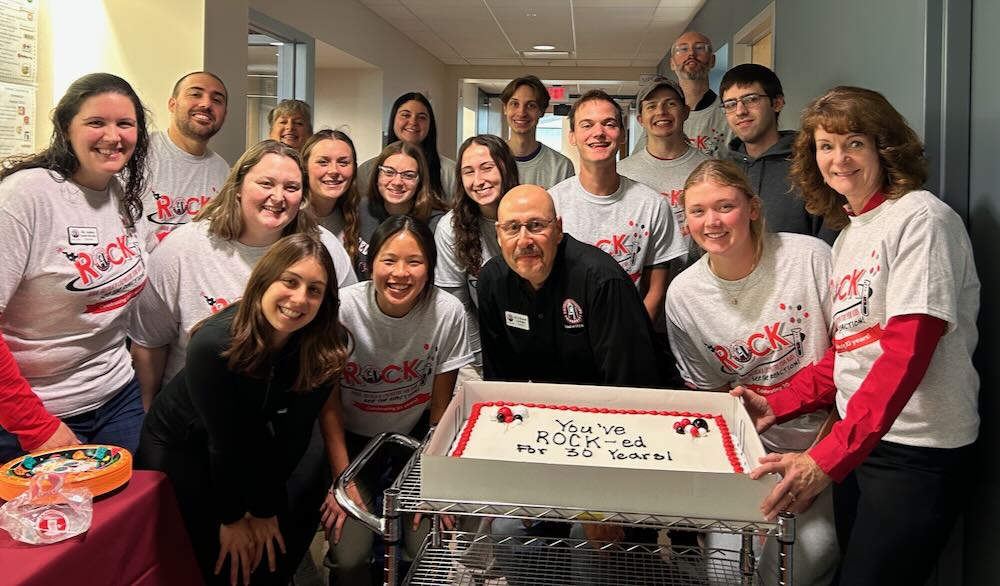Rural Outreach Chemistry for Kids Turns 30

“Science is so much more than books…”
The R.O.C.K. program celebrates 30 years of community outreach
Since 1995, the Rural Outreach Chemistry for Kids (R.O.C.K.) program at Saint Francis University has had an enormous impact on the community at large, SFU students, and many others. It has held over 3,700 events reaching over 86,000 school children and community members, and with the passion and dedication of the students and faculty the program will only continue to grow.
“The kids always have so much fun, because hands-on science is fun,” said Mason Hogue, the current student leader of the R.O.C.K. program. “And it is just as beneficial to college students as it is to school students.”
How it started
When Dr. Edward Zovinka, a professor of inorganic chemistry, joined the faculty at Saint Francis in 1994, he was tasked with finding a way to get chemistry out into the local community.
“We also had very few chemistry majors at the time,” Dr. Zovinka said. “I realized that if I wanted chemistry majors to teach, I had to go out and find them.”
With that in mind, he began to reach out to teachers at the nearby schools, and by the following year, the R.O.C.K. program was up and running. Although in its first year, the program only held six events, reaching 100 local children, over the past 10 years R.O.C.K. has averaged 225 events each year, reaching 5,000 kids annually.
“Teachers love to have exciting things in their classrooms,” said Dr. Ashley Smith-Diemler, an assistant professor of chemistry, and the current faculty advisor of R.O.C.K. “And the students love the hands-on activities like making silly putty and slime and liquid nitrogen ice cream.”
“The teachers and students have really pushed us to grow,” added Dr. Zovinka. “Our students in chemistry had to buy in to the program, but they have really embraced it.”
In fact, it is because of the hard work of the program’s student leaders and volunteers that R.O.C.K. has hit all kinds of record numbers over the years.
“We have a great student body who is always willing to help out,” said Hogue. “I, personally, am willing to put in multiple events per week to fulfill teachers’ event requests and help the program succeed.”
Currently, the group averages two to four events each week during the semester. Over the longer winter and spring breaks they will do day-long visits to schools where they hold events in numerous classrooms, reaching up to 400 school-aged students in one day. They have developed many hands-on experiments for students in grades K-12, ranging from oobleck and slime to eggshell geodes, bath bombs, and simple machines to forensics and DNA extraction.
R.O.C.K.’s impact
Today, the R.O.C.K. program serves the wider community around Saint Francis, hosting events in 10 counties of Pennsylvania. The group visits K-12 classrooms in schools all across the region, and hosts events at local libraries, children’s museums, community centers, fairs, and other community events. The program has been so well-received that it is often recognized while out and about, and thanks to the generous donation from Thomas Family Automotive, the famous R.O.C.K. van can be spotted anywhere it goes.
Over the years, the R.O.C.K. program has been generously funded by many groups and organizations, who have donated money, time, and materials, and it has received grants secured through the hard work of SFU students and faculty. These donations have allowed the program to succeed and grow, offering a service to many school districts that cannot otherwise afford the equipment and materials for hands-on science experiments.
“We visit a lot of under-funded schools that don’t have the money to do a lot of hands-on science experiments – they just have books. But science is so much more than books,” said Hogue. “Our events help to change how the students at these schools perceive science and get more people involved in science.”
In some cases, students who have participated in R.O.C.K. events in their elementary or high school have gone on to attend other various science camps and summer programs hosted by the SFU School of STEAM, according to Dr. Rose Clark, a professor of analytical chemistry at the University.
“We have had chemistry majors come to SFU after first meeting them in a R.O.C.K. program in elementary school,” added Dr. Zovinka.
Not only has the R.O.C.K. program succeeded in making science fun for school-aged children but has also provided its own SFU students with many research opportunities. The student leaders, volunteers, and faculty have produced numerous scholarly works including peer-reviewed publications and presentations. Drs. Zovinka and Clark are also the authors of two books related to teaching young children about the joys of chemistry.
Hogue, a chemistry major with minors in engineering and math, says he would recommend volunteering with the R.O.C.K. program to students of any major.
“It really helps to teach leadership skills and communication skills,” he said. “And it really teaches you humility by helping out the community.”
Learn about majoring in chemistry at SFU.
Scroll Down Memory Lane
Flip through the booklet below to learn about Rural Outreach for Kids at SFU, its student leaders, and the impact of the R.O.C.K program over the past 3 decades.